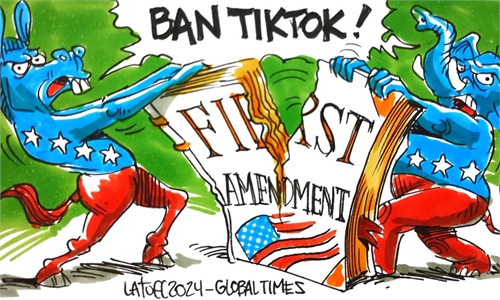
TikTok Photo: VCG
TikTok said on Thursday that it will challenge Canada's order to shut down its operations in Canada, saying that Ottawa's move of destroying hundreds of well-paying local jobs is not in anyone's best interest.Chinese observer said that Canada's move, which lacked a factual basis, is another case of manipulating the concept of national security and will only serve to undermine Canada's vitality and creativity.
The Canadian government announced on November 6 that it has ordered ByteDance's Canadian subsidiary, TikTok Technology Canada, to cease operations in the country following a multi-step national security review process.
"The government is taking action to address the specific national security risks related to ByteDance Ltd's operations in Canada through the establishment of TikTok Technology Canada Inc," Innovation Minister Francois-Philippe Champagne said in a statement.
Responding to the order, TikTok said that "shutting down its Canadian offices and destroying hundreds of well-paying local jobs is not in anyone's interest and the order will do just that," according to an announcement on its website.
"We will challenge this order in court," TikTok said, noting that the TikTok platform will remain available for creators to find an audience, explore new interests and for businesses to thrive.
The Canadian government said the decision was made in accordance with the Investment Canada Act, which allows for the review of foreign investments that may be injurious to Canada's national security.
Ottawa last year began reviewing TikTok's plan to invest and expand its business in Canada, Reuters reported.
"The judgment lacks a factual basis and is largely speculative," Zhou Mi, a senior research fellow at the Chinese Academy of International Trade and Economic Cooperation, told the Global Times on Thursday. "If government decisions are driven by conjecture or solely modelled on other countries' practices, Canada's investment environment could become highly uncertain," he said.
Zhou noted that overextending national security measures could actually heighten security risks by reducing effective market supply and competition.
"Any company investing in Canada expects a fair, equitable, and predictable environment," Zhou said. "Taking this approach sets a harmful precedent that could negatively impact the innovation and diversity of Canada's economy."
On October 1, Canada imposed a 100 percent duty on electric vehicle imports from China. On the same day, the Canadian government published the finalized list of Chinese steel and aluminum products that will be subject to a 25 percent surtax, effective October 22.
Zhou criticized the series of Canada's recent moves following in certain countries' footsteps, saying it indicates that its trade policies are increasingly unfriendly to China, and that it may further expand tariff measures on Chinese goods.
China's Ministry of Commerce stated on October 2 that these actions violate the principles of the market economy and fair competition, severely damaging normal trade and economic cooperation between Chinese and Canadian businesses.
Global Times





